|
|
|
Sort Order |
|
|
|
Items / Page
|
|
|
|
|
|
|
| Srl | Item |
| 1 |
ID:
091547
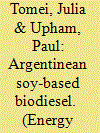

|
|
|
|
|
| Publication |
2009.
|
| Summary/Abstract |
This paper explores the economic, social and environmental context, drivers and impacts of increased demand for Argentine soy-based biodiesel. It is based on extensive stakeholder interviews in Argentina, including those in government, academia and the third sector; as well as participant observation with communities in soy cultivation areas; and review of relevant academic and grey literatures. Given Argentina's history of political instability and relatively weak levels of environmental protection, there is reason to be sceptical of the likely effectiveness of biofuel sustainability certification as applied to Argentine soy. Direct contracts between feedstock producers and biodiesel retailers may be a more reliable approach to minimise adverse environmental and social impacts than certification alone.
|
|
|
|
|
|
|
|
|
|
|
|
|
|
|
|
| 2 |
ID:
094940
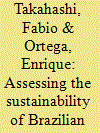

|
|
|
|
|
| Publication |
2010.
|
| Summary/Abstract |
The aim of this paper is to make an emergy assessment of oleaginous crops cultivated in Brazil, available to produce biodiesel, in order to determine which crop is the most sustainable. This study evaluates conventional agro-chemical farms that produce rapeseed (canola), oil palm, soybean, sunflower and cotton. Rapeseed (canola) crop uses 40.41% of renewable energy and it is the most sustainable conventional oil crop; on the other hand, it is not widely produced in Brazil, probably due to climate restrictions or low market demand. The oil palm emergy indicators are contradictory: its emergy exchange ratio (EER) value is the lower, showing the possibility of fair exchange, and the low transformity value indicates high efficiency; however, it also has low renewability (28.31%), indicating a high dependency on agro-chemicals (basically fertilizers). Oil palm is a potential energy source due to its high agricultural productivity, but appropriate management is necessary to increase its sustainability and reduce the use of non-renewable resources.
|
|
|
|
|
|
|
|
|
|
|
|
|
|
|
|
| 3 |
ID:
116752
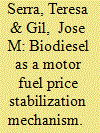

|
|
|
|
|
| Publication |
2012.
|
| Summary/Abstract |
This article studies the capacity of biofuels to reduce motor fuel price fluctuations. For this purpose, we study dependence between crude oil and biodiesel blend prices in Spain. Copula models are used for this purpose. Results suggest that the practice of blending biodiesel with diesel can protect consumers against extreme crude oil price increases.
|
|
|
|
|
|
|
|
|
|
|
|
|
|
|
|
| 4 |
ID:
094295
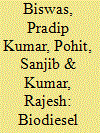

|
|
|
|
|
| Publication |
2010.
|
| Summary/Abstract |
The need for biofuels, particularly liquid ones like ethanol and biodiesel, has been felt by most of the countries and their governments have been trying to promote these fuels. Following in line with global trend, India declared its biofuel policy in which biodiesel, primarily from jatropha, would meet 20% of the diesel demand beginning with 2011-2012. In spite of the efforts made by the state, production of biodiesel, however, has not picked up at all. Doubt arises as to whether the country will be able to meet the target. It is felt that the government policy, particularly regarding land utilization, organizing cultivation of jatropha and pricing of jatropha seeds, needs to be more clear. This paper attempts to make an assessment of the state of India's biofuel programme and to identify the hurdles that policy-maker need to overcome to achieve the goal.
|
|
|
|
|
|
|
|
|
|
|
|
|
|
|
|
| 5 |
ID:
097216


|
|
|
|
|
| Publication |
2010.
|
| Summary/Abstract |
The Brazilian National Program for Production and Use of Biodiesel (PNPB in Portuguese) has created a huge demand for biodiesel in Brazil. The PNPB is strongly based on social development through the inclusion of family farmers in projects integrated with biodiesel power plants. Among the various oilseeds, castor bean (Ricinus communis L.) was identified as the ideal one to promote social development in the semi-arid region. However, although promising, the mechanisms of the federal program are still insufficient to promote the effective participation of family farmers. This research shows that companies are facing huge problems in implementing contracts with family farmers. It describes and analyzes the functioning dynamics of this agro-production chain. This paper addresses the identification and the discussion of these obstacles, in order to increase the competitiveness of the biodiesel agribusiness chain, based on castor oil social projects in Brazil.
|
|
|
|
|
|
|
|
|
|
|
|
|
|
|
|
| 6 |
ID:
097337


|
|
|
|
|
| Publication |
2010.
|
| Summary/Abstract |
The Brazilian National Program for Production and Use of Biodiesel (PNPB in Portuguese) has created a huge demand for biodiesel in Brazil. The PNPB is strongly based on social development through the inclusion of family farmers in projects integrated with biodiesel power plants. Among the various oilseeds, castor bean (Ricinus communis L.) was identified as the ideal one to promote social development in the semi-arid region. However, although promising, the mechanisms of the federal program are still insufficient to promote the effective participation of family farmers. This research shows that companies are facing huge problems in implementing contracts with family farmers. It describes and analyzes the functioning dynamics of this agro-production chain. This paper addresses the identification and the discussion of these obstacles, in order to increase the competitiveness of the biodiesel agribusiness chain, based on castor oil social projects in Brazil.
|
|
|
|
|
|
|
|
|
|
|
|
|
|
|
|
| 7 |
ID:
088058


|
|
|
|
|
| Publication |
2009.
|
| Summary/Abstract |
Although Argentina came late to the biofuels revolution, a series of measures taken recently at federal and provincial government level have created new opportunities. New federal laws on biofuels promotion have sparked an investment boom. The main activity has been in the biodiesel sector-partly because diesel is the dominant fuel sector in Argentina, and partly because the country had already engineered a soy revolution over the past 15 years, becoming the world's largest exporter of soy oil and soy meal. Biodiesel allows this revolution to be extended-from soy as foodstuff to soy as fuelstock. The biodiesel revolution now underway promises to extend Argentina's latecomer advantages by combining greater scale and lower costs with introduced technical innovations such as genetically modified crops and no-till farming. In this way, Argentina can be seen to be demonstrating the superiority of biofuel production in countries of the South over the conditions obtaining in countries of the North-including superior resources availability, superior energetics and lower costs. Whereas Brazil has demonstrated its superiority in sugarcane-based ethanol, Argentina is about to demonstrate its superiority in soy-based biodiesel.
|
|
|
|
|
|
|
|
|
|
|
|
|
|
|
|
| 8 |
ID:
092579


|
|
|
|
|
| Publication |
2009.
|
| Summary/Abstract |
Some European experts on normalization of transport fuels have recently suggested the suppression of the cetane-number limitation from the European biodiesel norm when its final destination is blending with diesel fuel. Although this measure should not affect the range of oils used for biodiesel production (only few of them lead to biodiesel fuels with cetane numbers below this limit), the trend of cetane number to decrease with increasing unsaturation could reinforce the arguments to maintain the iodine-number limitation as an indirect limit for the cetane number.
The iodine number has frequently been subjected to controversy because its stringent limitation in Europe prevents from using differently unsaturated fatty oils for biodiesel production. Some of the arguments in favour of extending or eliminating the iodine-number limitation in the norm are exposed here. Previously, a correlation for the estimation of the cetane number based on a literature review is proposed. From this correlation, a procedure is proposed for the estimation of the limiting effect of the current cetane-number limitation on the unsaturation degree of biodiesel fuels. Finally, the impact of the elimination of the cetane-number limitation on the use of different oils for biodiesel production is analyzed.
|
|
|
|
|
|
|
|
|
|
|
|
|
|
|
|
| 9 |
ID:
111382


|
|
|
|
|
| Publication |
2012.
|
| Summary/Abstract |
Jatropha, a non-edible oil seed yielding plant has been identified by the Government of India to produce biodiesel under National Biodiesel Mission. Failure of phase-I of National Biodiesel Mission and likely failure of phase-II requires critical analysis of policy frameworks related to its long term sustainability. Indian biofuel promotion policies like Biodiesel Purchase Policy and National Biofuel Policy have failed to yield any visible results. No tangible ground work is visible as of now to ensure success of various government plans and policies related to adoption of jatropha biodiesel. It is clearly evident that some serious bottlenecks are delaying the adoption of jatropha biodiesel. Present work identifies important policy bottlenecks like availability of land, non-remunerative pricing policy and state fear relating to loss of revenue in the case of zero duty regimes. This paper attempts to explore and critically analyze present policies and possible options taking into account the recent Indian experiences for successful adoption of jatropha biodiesel.
|
|
|
|
|
|
|
|
|
|
|
|
|
|
|
|
| 10 |
ID:
113425
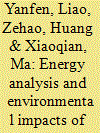

|
|
|
|
|
| Publication |
2012.
|
| Summary/Abstract |
The entire life cycle of biodiesel produced by microalgal biomasses was evaluated using the method of life cycle assessment (LCA) to identify and quantify the fossil energy requirements and environmental impact loading of the system. The life cycle considers microalgae cultivation, harvesting, drying, oil extraction, anaerobic digestion, oil transportation, esterification, biodiesel transportation and biodiesel combustion. The investigation results show that the fossil energy requirement for the biodiesel production is 0.74 MJ/MJ biodiesel, indicating that 1 MJ of biodiesel requires an input of 0.74 MJ of fossil energy. Accordingly, biodiesel production is feasible as an energy producing process. The environmental impact loading of microalgal biodiesel is 3.69 PET2010 (Person Equivalents, Targeted, in 2010) and the GWP is 0.16 kg CO2-eq/MJ biodiesel. The effects of photochemical ozone formation were greatest among all calculated categorization impacts. The fossil energy requirement and GWP in this operation were found to be particularly sensitive to oil content, drying rate and esterification rate. Overall, the results presented herein indicate that the cultivation of microalgae has the potential to produce an environmentally sustainable feedstock for the production of biodiesel.
|
|
|
|
|
|
|
|
|
|
|
|
|
|
|
|
| 11 |
ID:
111754


|
|
|
| 12 |
ID:
125435
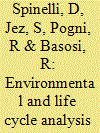

|
|
|
|
|
| Publication |
2013.
|
| Summary/Abstract |
The Directive 2009/28/EC established the overall target that 20% of energy consumption should be represented by renewable energy sources by 2020 in each European member state. Furthermore, the Directive sets a mandatory 10% minimum target for biofuels in the transport sector.
Biofuels are potentially an important alternative to mineral diesel. We propose a pilot production line of biodiesel from sunflower on local scale in the Province of Siena (Tuscany) to research a possible reduction of fossil fuel consumption in the transport sector.
This study might represent an opportunity to reduce petroleum dependence in the transport sector.
Environmental Impact Indicators were provided by Material Flow Accounting, Embodied Energy Analysis and Emergy Accounting. Results showed that agricultural phase is the critical step in the production line.
A comparative Life Cycle Assessment analysis for the biodiesel production line with mineral diesel production showed environmental advantages of the biofuel production, however requiring a higher land demand. Therefore, biodiesel may not the optimal solution on large scale but might be a good alternative to fossil fuel. This would depend upon the entire production cycle taking place in a limited area. This is necessary in order to fulfill the needs of local farms and small enterprises.
|
|
|
|
|
|
|
|
|
|
|
|
|
|
|
|
| 13 |
ID:
127298


|
|
|
|
|
| Publication |
2014.
|
| Summary/Abstract |
Biodiesel production in Brazil has grown from 736 m3 in 2007 to 2.7 Mm3 in 2012. It is an emergent bioenergy for which it is important to guarantee environmental sustainability. The objective of this article is to characterise the biodiesel production chain in Brazil, to identify potential environmental impacts and to analyse key drivers and barriers for biodiesel environmental sustainability. This article explores these aspects and focusses on the increasing demand for the main feedstocks for biodiesel production in Brazil: soybean oil and beef tallow. The impacts of land use and land-use change on greenhouse gas emissions, biodiversity and water, as well as the energy balance, were found to be critical for the environmental sustainability assessment and development of biodiesel chains. Increasing agriculture yields, diversifying feedstocks and adopting ethyl transesterification can contribute to minimise environmental impacts. It was also found that environmental impacts could be mitigated by appropriate policies aiming at an integrated optimisation of food and bioenergy production and through agro-economic-ecological zoning, allowing adequate use of land for each purpose. Despite the limitation and weakness of some sustainability tools and initiatives, certification and zoning can play an important role in the sustainability of the emerging biodiesel production in Brazil.
|
|
|
|
|
|
|
|
|
|
|
|
|
|
|
|
| 14 |
ID:
091573


|
|
|
|
|
| Publication |
2009.
|
| Summary/Abstract |
The recent moves towards the insertion of biofuels in the energy matrix of a number of countries are opening new prospects for agricultural production and for agroindustrial chains. The emergence of this new productive base raises new research issues: in what circumstances are the structuring, organization and implementation of these biodiesel productive chains taking place in Brazil? What are the effects of biodiesel production on local economies? Hence, the central objective of this study is identifying their economic and social impacts at the regions where they are installed. The analytical structure was constructed based on theories of regional and spatial economy: location coefficient, shift-share, theories of industrial location. A preliminary analysis identified that a biodiesel productive arrangement is emerging in the State of Piauí, Northeastern Brazil, with the purpose of stimulating regional development using alternative oil-bearing crops. However, the agricultural project in the town of Canto do Buriti/PI has faced problems of both a cultural and productive nature. Preliminary findings reveal productive, organizational, managerial and governance related difficulties and challenges that need to be faced when establishing a new productive base in a location that up to that point lacks a productive tradition.
|
|
|
|
|
|
|
|
|
|
|
|
|
|
|
|
| 15 |
ID:
116992


|
|
|
|
|
| Publication |
2012.
|
| Summary/Abstract |
The need to mitigate climate change makes production of liquid biofuels a high priority. Substituting fossil fuels by biodiesel produced from Jatropha curcas has gained widespread attention as Jatropha cultivation is claimed to offer green house gas emission reductions. Farmers respond worldwide to this increasing demand by converting forests into Jatropha, but whether Jatropha-based biodiesel offers carbon savings depends on the carbon emissions that occur when land use is changed to Jatropha. This paper provides an impact assessment of a small-scale Jatropha project in Cabo Delgado, Mozambique. The paper outlines the estimated impacts on above and below-ground carbon stocks when land use is changed to increase Jatropha production. The results show that expansion of Jatropha production will most likely lead to the conversion of miombo forest areas to Jatropha, which implies a reduction in above and below-ground carbon stocks. The carbon debts created by the land use change can be repaid by replacing fossil fuels with Jatropha-based biodiesel. A repayment time of almost two centuries is found with optimistic estimates of the carbon debt, while the use of pessimistic values results in a repayment time that approaches the millennium.
|
|
|
|
|
|
|
|
|
|
|
|
|
|
|
|
| 16 |
ID:
111091


|
|
|
|
|
| Publication |
2012.
|
| Summary/Abstract |
Connecting (small) family farmers to the emerging biodiesel industry requires careful design of the institutional arrangements between the producers of oil crops and the processing companies. According to institutional economics theory, the design of effective and efficient arrangements depends on production and transaction characteristics, the institutional environment, and the organizational environment supporting the transaction between producers and the industry. This paper presents a comparative study on two cases in the feedstock-for-biodiesel industry in the state of Minas Gerais, Brazil. The two case studies represent the production and transaction system of soybeans (Glycine max L. Merrill) and castor beans (Ricinus communis L.). Important elements of effective and efficient institutional arrangements are farmer collective action, availability of technical and financial support, and farmer experience with particular crops.
|
|
|
|
|
|
|
|
|
|
|
|
|
|
|
|
| 17 |
ID:
105758
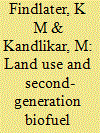

|
|
|
|
|
| Publication |
2011.
|
| Summary/Abstract |
Governments around the world see biofuels as a common solution to the multiple policy challenges posed by energy insecurity, climate change and falling farmer incomes. The Indian government has enthusiastically adopted a second-generation feedstock - the oilseed-bearing shrub, Jatropha curcas - for an ambitious national biodiesel program. Studies estimating the production capacity and potential land use implications of this program have typically assumed that the 'waste land' slated for Jatropha production has no economic value and that no activities of note will be displaced by plantation development. Here we examine the specific local impacts of rapid Jatropha plantation development on rural livelihoods and land use in Rajasthan, India. We find that in Jhadol Tehsil, Jatropha is planted on both government and private land, and has typically displaced grazing and forage collection. For those at the socioeconomic margins, these unconsidered impacts counteract the very benefits that the biofuel programs aim to create. The Rajasthan case demonstrates that local land-use impacts need to be integrated into decision-making for national targets and global biofuel promotion efforts.
|
|
|
|
|
|
|
|
|
|
|
|
|
|
|
|
| 18 |
ID:
124154


|
|
|
|
|
| Publication |
2013.
|
| Summary/Abstract |
This study presents a model of an ecotechnology that combines algae cultivation with anaerobic digestion in order to recycle nutrients and to reduce the need for external energy. The concept is to convert organic waste into several products, such as electricity, biodiesel and organic fertilizer. It is labeled as the ACAD biorefinery. The simulation model of the ACAD biorefinery proved itself to be a powerful tool for understanding the symbioses and dynamics of the system, and therefore also a good tool for reaching political decisions. The model shows that the ACAD biorefinery could be totally independent of external energy supplies. Energy calculations indicate that more energy can be produced by combining the algae cultivation and anaerobic digestion processes. For every unit of energy entering the system in feedstock, 0.6 units of energy are exported as either biodiesel or electricity. The exported electricity accounts for approximately 30% of the total exported energy, while the remaining 70% is exported as biodiesel. By producing its own energy, the biorefinery improves its renewability and level of carbon neutrality.
|
|
|
|
|
|
|
|
|
|
|
|
|
|
|
|
| 19 |
ID:
128355


|
|
|
|
|
| Publication |
2014.
|
| Summary/Abstract |
Energy crises reverberate within societies and encourage worldwide change in this industry. In this context, Brazil has been consolidating the National Program for the Production and Use of Biodiesel (Programa Nacional de Produção e Uso do Biodiesel-PNPB). This article analyzes BSBIOS and PETROBRAS BIOFUELS, which is a company that is incorporated under the PNPB. After providing an overview, the manuscript focuses on the criteria used for the selection of the agricultural raw materials used in the biodiesel industry. A reference model that considered the economic, technological, and social dimensions was developed; these dimensions were analyzed in relation to the production matrices of the soybean, canola, sunflower, and castor plants. The company strategically opted to establish programs for promoting the production of only soybean and canola. In the short term, the company has accepted the evidence that the main source of raw materials is soybean production. This decision was made considering the multicriteria analysis that was developed, which involved a number of economic, technological, and social aspects. Consequently, this analysis used in the decision-making process exhibits both a macro (the national and international environment) and a micro perspective (the companies' reality).
|
|
|
|
|
|
|
|
|
|
|
|
|
|
|
|
| 20 |
ID:
177491
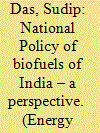

|
|
|
|
|
| Summary/Abstract |
The National Policy on Biofuels (NPB) 2018 was adopted on May 16, 2018 in India to augment the generation of biofuels and to build a sustainable biofuel ecosystem. The Biodiesel Blending programme (BBP) got affected due to lack of sufficient feedstock coupled with an 18% Goods and Services Tax (GST) effective from July 1, 2017. The high GST resulted in the price of biodiesel being higher than that of conventional diesel thereby hindering the blending mandates. Most states in India do not allow free interstate movement of molasses resulting in artificially depressed prices besides derailing the Ethanol Blending Petrol (EBP) programme. NPB 2018 prohibits the import and export of biofuels to other nations resulting in reduced economic efficiency. The use of foodgrains as feedstock for biofuel production hampers food availability to the needy people and adversely affects food prices. The higher funding and incentives proposed to 2G ethanol production in NPB 2018 needs to be extended to 1G ethanol also as majority of the ethanol production happens through 1G. The paper touches upon the key biofuel policies of various nations, features of NPB 2018 and its critical analysis, BBP and EBP programmes and their current challenges and suggests future reforms.
|
|
|
|
|
|
|
|
|
|
|
|
|
|
|
|
|
|
|
|
|